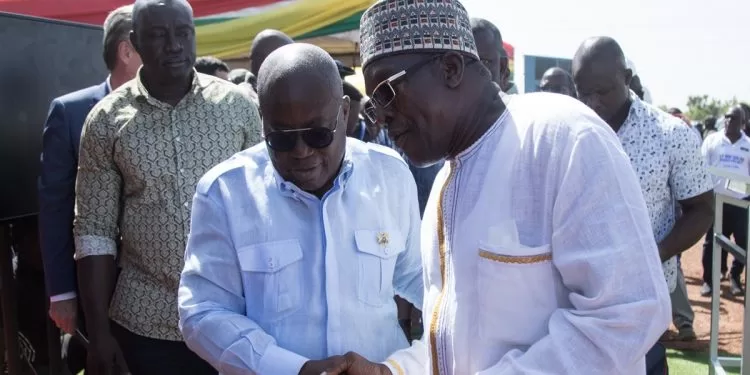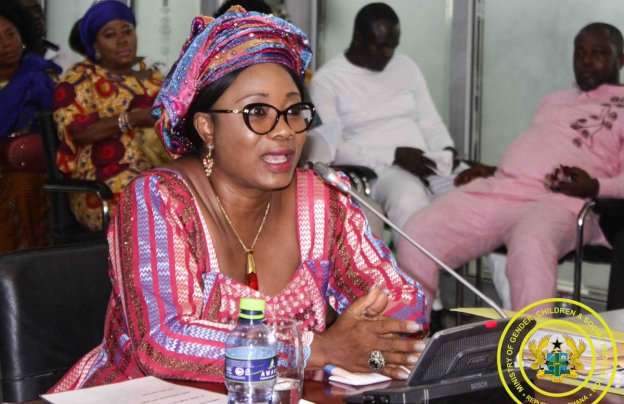The Speaker of Parliament, Alban Bagbin, has issued a statement reiterating his criticism of President Akufo-Addo for refusing to assent to the Criminal Offences Amendment Bill 2023, 1 and 2, and the Ghana Armed Forces Amendment Bill 2023.
The Speaker said the President’s stance does not only contradict constitutional procedure, but it also raises concerns about the future of Private Members’ Bills.
“This approach, as taken by the President, not only contradicts the constitutional procedure but also poses serious implications for the future of Private Members’ Bills, as it implies an unrealistic standard where virtually every bill could be construed as having financial implications,” the Speaker’s statement issued on Friday, December 29, stated.
Read the full statement below
STATEMENT BY THE SPEAKER ON THE REFUSAL OF THE PRESIDENT TO ASSENT TO THE CRIMINAL OFFENCES (AMENDMENT) BILL 2023, CRIMINAL OFFENCES (AMENDMENT) (NO 2) BILL, 2023 AND THE ARMED FORCES (AMENDMENT) BILL, 2023.
- Honorable Members, as you may recall, on Monday, the 18th of December 2023, I brought to your attention the President’s refusal to assent to three crucial bills, a decision conveyed through a letter dated the 12th of December 2023.
- The Bills the subject of His Excellency’s communication to me are:
- The Criminal Offences (Amendment) Bill 2023.
- The Criminal Offences (Amendment) (No.2) Bill, 2023, and
- The Armed Forces (Amendment) Bill, 2023.
- Following the reading of this letter, I openly expressed my strong disagreement with the President’s position on the matter. Today, I present this formal statement to thoroughly articulate the reasons behind my dissent and to lay a clear path for this esteemed House to deliberate on our subsequent actions.
- At the outset, it is imperative to remind ourselves of our collective responsibility, be it as members of the executive, judiciary, legislature, or as citizens of Ghana, to uphold and defend the Constitution. The Constitution is supreme and serves as the litmus test to determine the validity or otherwise of our actions.
- Let me recount the famous dictum of Acquah JSC (as he then was) who noted rather succinctly in the case of Mensima v Attorney-General[1] as follows;
“Article 1(2) of the 1992 Constitution is the bulwark which not only fortifies the supremacy of the Constitution but also makes it impossible for any law or provision inconsistent with the Constitution to be given effect to”
- The supremacy of the 1992 Constitution as asserted by the Supreme Court, is critical. Under the concept, governmental powers, be they executive, legislative or judicial are to be exercised subject to the provisions and dictates of the Constitution.
- This Parliament, unique in our nation’s history, now stands at the precipice of an unprecedented challenge. For the first time, especially under the fourth republic, we are witnessing a President’s refusal to assent to and to retain three bills, that have been passed by Parliament. This situation demands our utmost prudence and a deep sense of gravity, as it bears significant implications for the evolution and resilience of our burgeoning democracy.
- Our roles as the President, Speaker of Parliament, Members of Parliament, among others, are conferred upon us by the 1992 Constitution. It is of utmost importance that we remain acutely aware of the Constitution’s provisions, ensuring that in exercising the powers bestowed upon us, we adhere strictly to the boundaries and limits set forth. Our actions and decisions must always reflect a deep respect for, and adherence to, the constitutional framework that governs our nation.
Background
- Hon. Members, to ensure my position on this matter is clearly contextualized, an exegesis on how we got here is required.
On the 9th of June 2021, the Hon. Member for the Madina Constituency, Hon. Francis-Xavier Kojo Sosu submitted his intention to sponsor a Private Member’s Bill to amend the Criminal Offences Act, 1960 (Act 29) which bill would effectively remove the death penalty from our statute books.
- Hon Members are conversant with Ghana’s pro abolitionist position on the death penalty since 1993 and the strong proposal to replace it with imprisonment for life.
- In answering an urgent question filed by Hon Francis Xavier Kojo Sosu on July 28, 2021, the Minister for Justice and the Attorney General suggested Parliament could enact the relevant laws to amend the existing law, via a private member’s bill. See the official reports of 27th July 2021, page 064, paragraph 2.
- On the 9th June 2021, the said Member submitted a request to Parliament for the drafting of a Private Member’s Bill to amend the Criminal Offences Act, 1960 (Act 29) to give effect to the recommendations of the Constitution Review Commission on the abolition of the death penalty. On the advice of the Legislative Drafting Office of Parliament, the Speaker admitted the request of the member and directed the Drafting Office to submit a draft legislation for the consideration and comments of the Member.
- Given the sensitive and critical nature of this Bill, it underwent extensive stakeholder consultations to gather diverse perspectives on its provisions. Among the stakeholders engaged were the Minister of Justice and the Attorney General, Justice of the Court of Appeal, Diplomats, Chiefs, private legal practitioners, representatives from the Ghana Police Service and Ghana Armed Forces, Amnesty International and various human rights groups. The feedback was overwhelmingly positive, with many stakeholders acknowledging the Bill’s merits and lending it their robust support.
- The Attorney-General’s department assisted the Committee throughout its meetings and workshops until the Bill was read the third time and passed on the 25th of July 2023. The bill was submitted to the President for assent by a letter dated 3rd August 2023 and assented to same day by the President, even though written 2nd August 2023, notified in the gazette as Criminal Offences (Amendment) Act, 2023, Act 1101, published and made available to the public.
- The Criminal Offences (Amendment) (No.2) Bill, work on which was initiated during the 7th Parliament of the Fourth Republic, was submitted in a form of a request by the Hon Member of Madina, on the 30th of September 2021. Three stakeholders’ engagement were organized in May 2022, with the members of the Coalition against Witchcraft Accusations in Ghana, Attorney-General’s department, etc. and the final draft bill submitted, gazette notification on the 7th of December 2022, and presented to the House for consideration and passage in March 2023. The Attorney-General’s department attended and assisted in the drafting of the bill until it was debated, considered and passed on the 27th July 2023.
- After its passage through Parliament, the Bill was sent to the President for assent. As mentioned earlier, the President declined to give his assent. He based his refusal on a detailed examination of the relevant constitutional and legislative frameworks, notably Article 108 of the Constitution and Section 100 of the Public Financial Management Act, 2016 (Act 921).
- The President’s assessment concluded that the Bills, introduced as private members’ Bills, failed to align with constitutional provisions. He concluded that, given their significant fiscal implications, these Bills should not have been introduced without a comprehensive fiscal impact analysis and without being initiated by, or on behalf of, the President.
- The foundation of my disagreement with the President’s position on the refusal to assent to the three bills is anchored on four critical aspects of constitutional interpretation and procedural adherence.
- Firstly, the suggestion in the Memorandum that there is an opportunity for the President to refuse to assent to Act 1101 is plainly erroneous. The Bill in respect of which the President may have refused assent, no longer existed to afford the President the opportunity to refuse to assent to it.
- Secondly there exists a fundamental discrepancy between the President’s understanding of Article 108, particularly regarding its fiscal implications, and the actual text and context of Articles 106 and 108 of the Constitution. This misinterpretation overlooks the nuanced distinction between fiscal and financial impacts as outlined in the Constitution.
- Thirdly, the determination of any unconstitutionality is the sole purview of the Supreme Court, not the President. Hence, if there were concerns about Parliament acting beyond its constitutional authority, i e acting ultra vures, the appropriate course of action would be an action before the Supreme Court, not an executive declaration of unconstitutionality.
- Again, the constitutional discretion vested in the presiding officer of Parliament, as per Article 108 and subject to Article 296, suggests that any allegations of misuse of this discretion should be contested in a court of competent jurisdiction, rather than being pre-emptively adjudicated upon by the President.
- Moreover, Article 106(8) clearly outlines the protocol for presidential refusal to assent, which involves specifying objections for Parliamentary reconsideration, not a blanket rejection of the bill. This approach, as taken by the President, not only contradicts the constitutional procedure but also poses serious implications for the future of Private Members’ Bills, as it implies an unrealistic standard where virtually every bill could be construed as having financial implications.
Examining Articles 106 and 108 and the exercise of legislative power.
- Article 106 of our Constitution is clear in its mandate. It provides that the power of Parliament to make laws is exercised through bills accompanied by detailed explanatory memoranda and published in the Gazette well before their introduction in Parliament. Let me quote Article 106 in extenso.
Article 106(1)
The power of Parliament to make laws shall be exercised by bills passed by Parliament and assented to by the President.
Article 106 (2)
No bill, other than such a bill as is referred to in paragraph (a) of article 108 of this Constitution, shall be introduced in Parliament unless –
(a) it is accompanied by an explanatory memorandum setting out in detail the policy and principles of the bill, the defects of the existing law, the remedies proposed to deal with those defects and the necessity for its introduction; and
(b) it has been published in the Gazette at least fourteen days before the date of its introduction in Parliament.
- Article 108 specifies the kind of legislation that requires introduction by or on behalf of the President, particularly focusing on fiscal matters such as the imposition or alteration of taxation or charges on public funds. It is my firm contention that the bill while carrying financial implications incidentally, do not fall within this narrow scope of fiscal legislation as defined by Article 108.
- Article 108 provides;
Parliament shall not, unless the bill is introduced or the motion is introduced by, or on behalf of, the President—
(a) proceed upon a bill including an amendment to a bill, that, in the opinion of the person presiding, makes provision for any of the following—
(i) the imposition of taxation or the alteration of taxation otherwise than by reduction; or
(ii) the imposition of a charge on the Consolidated Fund or other public funds of Ghana or the alteration of any such charge otherwise than by reduction; or
(iii) the payment, issue or withdrawal from the Consolidated Fund or other public funds of Ghana of
any moneys not charged on the Consolidated Fund or any increase in the amount of that payment, issue or withdrawal; or
(iv) the composition or remission of any debt due to the Government of Ghana; or
(b) proceed upon a motion, including an amendment to a motion, the effect of which, in the opinion of the person presiding, would be to make provision for any of the purposes specified in paragraph (a) of this article.
- Honourable Members, the Constitution must be read and interpreted as a cohesive whole. The framers of our Constitution, in their wisdom, did not intend to create an absurdity where any bill with financial consequences would fall under the stringent requirements of Article 108. Such a view would be overly restrictive and would significantly impede the legislative function of Parliament as envisaged under Article 106.
- The provisions in the Constitution are supposed to work harmoniously from a rational consistent framework. In the case of Tuffuor v Attorney General, the Supreme Court noted that;
“a construction should be avoided which leads to absurdity. And when a particular interpretation leads to two, shall we say inconsistent results, the spirit of the Constitution would demand that the more reasonable of the two should be adhered to. We must have recourse to the Constitution as a whole”
- A thorough review of Articles 106 through to 108 would outline the mode of exercising legislative powers and the limits thereto. The President admits in his letter that the Constitution admits a possible scenario of the initiation of Private Members Bills. That is not in contention.
- The text of Article 106 read together with Article 108 clearly demonstrates that not all bills to be deliberated upon by the House ought to be introduced by the President. Indeed Article 106(2) outlines that, the usual procedure for enacting bills does not apply to a special category of bills outlined in Article 108. Similarly, the restriction on delaying a bill in Parliament for more than three months applies only to bills initiated by the President as outlined in Article 106(14).
- To that extent, it is quite clear that the 1992 Constitution contemplates the introduction of bills otherwise than by the President. The restrictions on such bills include the bar on retrospectivity as outlined in Article 107 and then the settlement of financial matters as outlined in Article 108.
- The main question that then arises is if the provisions in Article 108 suggest that any bill that has financial implications for the state must be brought within the boundaries of that provision.
- To address this, let us turn to the language of Article 108(a)(ii), which states;
Parliament shall not, unless the bill is introduced or the motion is introduced by, or on behalf of, the President proceed upon a bill including an amendment to a bill, that, in the opinion of the person presiding, makes provision for the imposition of a charge on the Consolidated Fund or other public funds of Ghana or the alteration of any such charge otherwise than by reduction;
- The term imposition of a charge generally refers to the act of applying a fee, levy or financial demand on an individual, organization or entity. This provision, Honourable Members, speaks directly to the process of legally mandating payments or financial obligations from the Consolidated Fund or other public funds, which must be initiated by a bill presented by the President. The emphasis here is on direct financial obligations that is, explicit requirements for payments from these funds.
- This is essentially the legislative process of allocating money from the consolidated and other public funds for specific government expenditures.
- When read in conjunction with Article 108(a)(ii), Article 178 outlines the conditions under which withdrawals can be made from the Consolidated Fund. The Constitution provides in article 178(1)(a)
‘No moneys shall be withdrawn from the Consolidated Fund except to meet expenditure that is charged on that Fund by this Constitution or by an Act of Parliament…‘
- Similarly, Article 179 elaborates on the authorization of government expenditure, including the preparation of budget estimates by the President, which are then laid before Parliament.
- By reading these provisions conjunctively, it becomes clear that Article 108(a)(ii) is concerned with direct payments and explicit financial obligations from the Consolidated Fund and other public funds, primarily related to government expenditure. These are not just incidental or indirect financial implications but are specifically about the allocation and use of state funds in a direct manner.
- To further ground this analysis, Honorable Members, let us consider Chapter Thirteen of the Constitution, which deals with finance. This chapter provides the necessary context for dealing with fiscal matters, elaborating on the processes and principles governing the management of public funds, budgetary allocations, taxation and financial legislation.
- Reading Articles 108, 178 and 179 together, one can come to the conclusion that 108(a)(ii) relates to direct payments and financial obligations from the consolidated fund and other public funds to meet government expenditure.
- Let us consider the nature of the bills in question. While they may carry financial implications, primarily related to the costs of incarceration and healthcare, these do not amount to the direct imposition of a new charge on the Consolidated Fund or other public funds.
- The financial implications here are consequential and incidental, rather than being the creation of new fiscal obligations. Therefore, interpreting these bills as falling within the ambit of fiscal legislation as outlined in Article 108(ii) stretches the meaning of ‘imposition of a charge’ beyond its intended scope.
- Honourable Members, it is imperative to underscore that a literal and narrow interpretation of ‘fiscal bills’ could unduly constrict the legislative autonomy granted to Parliament. Such an approach would not only be contrary to the spirit of the Constitution but would also set a precedent that could hinder Parliament ability to address the diverse needs of our nation through legislation.
- Honourable Members, the bills under consideration do not create new fiscal obligations and, therefore, should not be constrained by the provisions of Article 108.
Determination of questions of Unconstitutionality
- It is worth noting that neither the President nor this House has the power to declare an act unconstitutional. Out of the abundance of caution, I must note that Article 2(1) of the Constitution outlines that any allegation of any unconstitutionality must of necessity be grounded in a cause of action before the Supreme Court.
- The Constitution vests the power to declare an act unconstitutional solely in the Supreme Court. This principle is central to the doctrine of separation of powers and the rule of law.
- Firstly, it is crucial to understand that if the President believed that Parliament acted ultra vires, or beyond its constitutional powers, in passing these bills, the constitutionally sanctioned course of action would be to refer the matter to the Supreme Court.
- The President does not possess the authority to unilaterally declare parliamentary actions unconstitutional based on personal or executive assessment. Such a course of action is not within the contemplation of our laws and breaches the established procedures for constitutional adjudication.
- Honourable Members, the presumption of regularity of official acts, a principle embedded in Section 37 of our Evidence Act, 1975 (NRCD 323), is pertinent. This presumption implies that official duties and actions, such as those undertaken by this Parliament, are presumed to have been carried out in accordance with the law and established procedures.
- In the context of our discussion, this means that the bills passed by Parliament are presumed to have been enacted following all due processes and constitutional requirements, unless proven otherwise.
- The burden of proof, therefore, lies on those who assert irregularity or unconstitutionality. Until evidence to the contrary is presented and substantiated in a court of competent jurisdiction, this presumption of regularity stands.
- Therefore, Honourable Members, in the absence of a judicial determination from the Supreme Court, the President’s unilateral assessment of unconstitutionality does not hold legal water. It is a departure from the established legal norms and practices that govern our constitutional democracy.
- The appropriate and lawful response, if there were genuine concerns about the constitutionality of the legislative actions of this House, would have been to seek judicial review from the Supreme Court. The steps taken by the President in this matter reflect a misunderstanding of the constitutional process and undermine the principles that uphold our democratic governance.
Article 108(b) and the exercise of discretion.
- Article 108(b) vests significant discretionary power in the person presiding over Parliament. This clause allows the presiding officer to make a determination on whether a bill, not introduced by or on behalf of the President, falls within the limitations set out in Article 108(a).
- Honourable Members, it is imperative to understand that this discretionary power is not arbitrary but is governed by the principles laid out in Article 296 of the Constitution. Article 296 regulates the exercise of discretionary power, mandating fairness, candidness, and reasonableness. It provides a framework within which such discretion must be exercised, ensuring that it is not used capriciously but in line with constitutional principles and the rule of law.
- Therefore, the determination of whether a bill complies with the stipulations of Article 108(a) is exclusively within the purview of the person presiding over Parliament. It is their constitutional mandate to assess and decide, guided by the principles of Article 296, whether the proposed legislation falls within the ambit of fiscal matters requiring presidential introduction.
- Honourable Members, unless there is a challenge in a court of competent jurisdiction asserting that the presiding officer’s discretion was exercised unlawfully or in contravention of the Constitution, the assessment and decision of the presiding officer stands. The President, in this context, does not hold the constitutional authority to make this determination or to override the discretion exercised by the presiding officer of Parliament.
- The discretionary power vested in the presiding officer is a safeguard of parliamentary autonomy and a cornerstone of our legislative process. Therefore, any attempt to usurp or undermine this discretion, not grounded in judicial review, is not only constitutionally unsound but also a breach of the fundamental principles that govern our democratic state.
Procedure for the refusal to assent to the bill.
- Under Article 106(8), when the President refuses to assent to a bill, two courses of action are available to him. Firstly, he is required to state in a memorandum to the Speaker the specific provisions of the bill which, in his opinion, need reconsideration by Parliament.
- This includes any recommendations for amendments, if necessary. Alternatively, the President can inform the Speaker that he has referred the bill to the Council of State for consideration and comment under Article 90 of the Constitution.
- Following this, Article 106(9) mandates that Parliament shall then reconsider the bill, taking into account the comments made either by the President or by the Council of State. This process ensures that the concerns raised are duly addressed and that the legislative process remains dynamic and responsive.
- Finally, Article 106(10) stipulates that if a bill, upon reconsideration, is passed by Parliament with a resolution supported by not less than two-thirds of all members of Parliament, the President is then obligated to assent to it within thirty days of the passing of the resolution.
- Honourable Members, this procedure underlines a critical aspect of our constitutional democracy. The President cannot out rightly reject a bill in its entirety. The constitutional route provided for dealing with disagreements on a bill requires specific actions, focused on collaboration and reconsideration, rather than outright dismissal.
- The approach adopted by the President in this instance, where the bill has been wholly rejected, is not within the contemplation of our laws as stipulated in Article 106. This procedure adopted by the President, bypassing dialogue and reconsideration, undermines the constitutional process and the legislative authority of Parliament.
Conclusion
- In light of these considerations, Honourable Members, it becomes clear that the actions taken by the President in refusing to assent to the bills do not align with the constitutional principles and procedures that govern our legislative process.
- This House, as the representative of the people and the custodian of legislative authority, must uphold the sanctity of the Constitution and ensure that its provisions are adhered to in both letter and spirit.
- Honourable Members, the floor is now open for your deliberations. This is a moment for us to engage in a thoughtful and constructive dialogue, to express our views, and to bring our collective wisdom to bear on this matter of national importance.
- The resolutions we arrive at, following these deliberations, will guide our next steps. They will form the basis of our collective response to the President and will chart the course for how this Parliament handles similar situations in the future. This is a defining moment for our democracy, and the decisions we make will have lasting implications.
- Our actions here will reaffirm our commitment to democratic principles and the rule of law, ensuring that the will of Parliament, as the embodiment of the people’s will, is respected and upheld.
- I thank you for your attention.
[1] [1996-97] SCGLR 676














